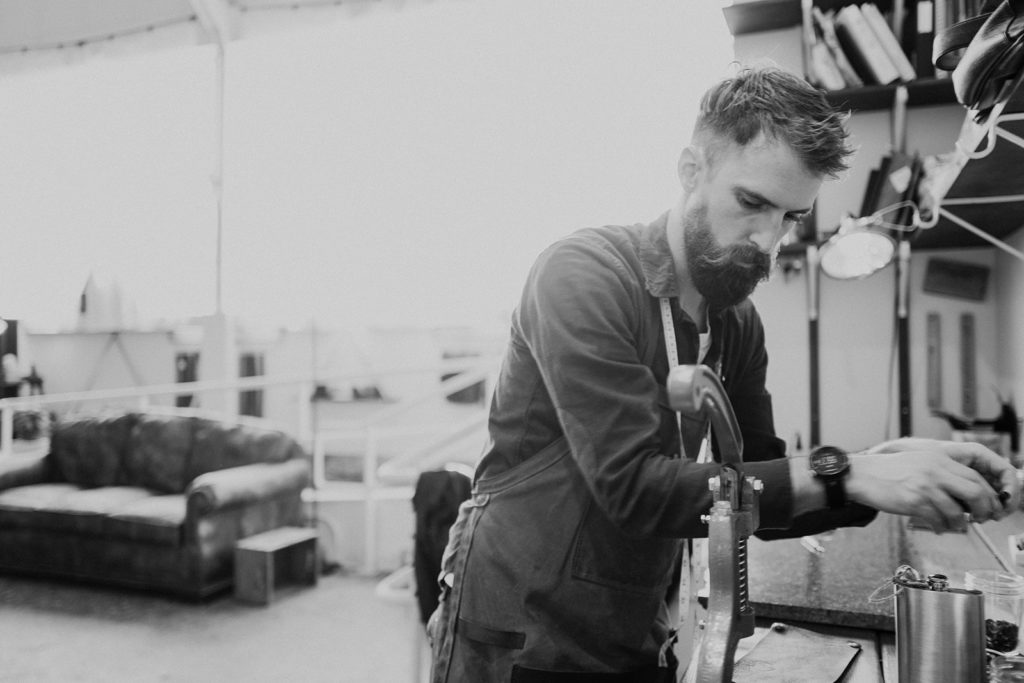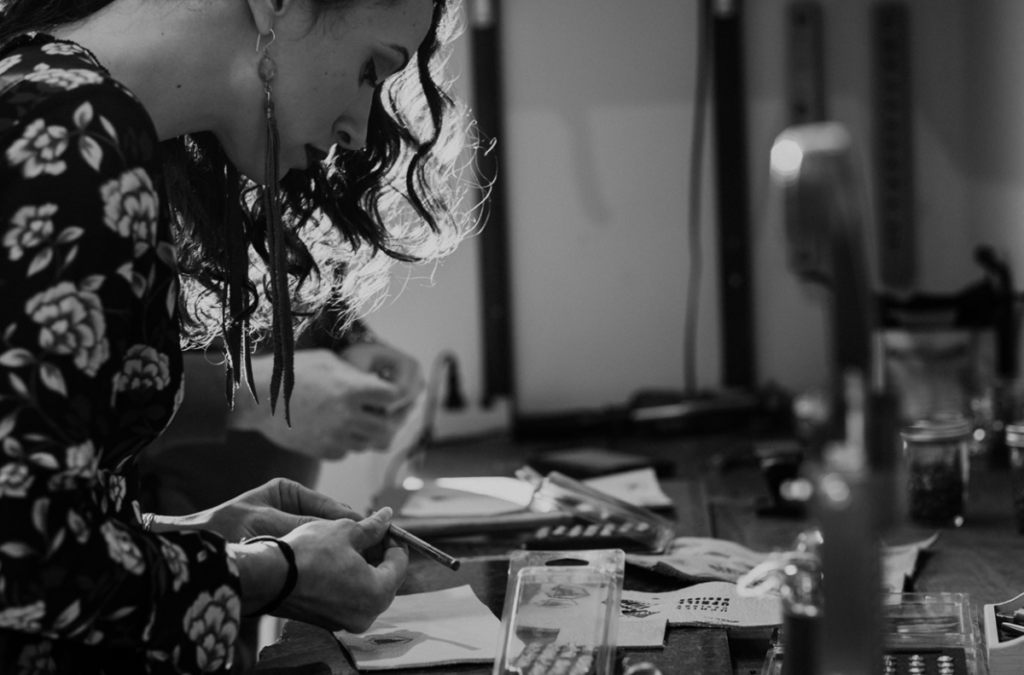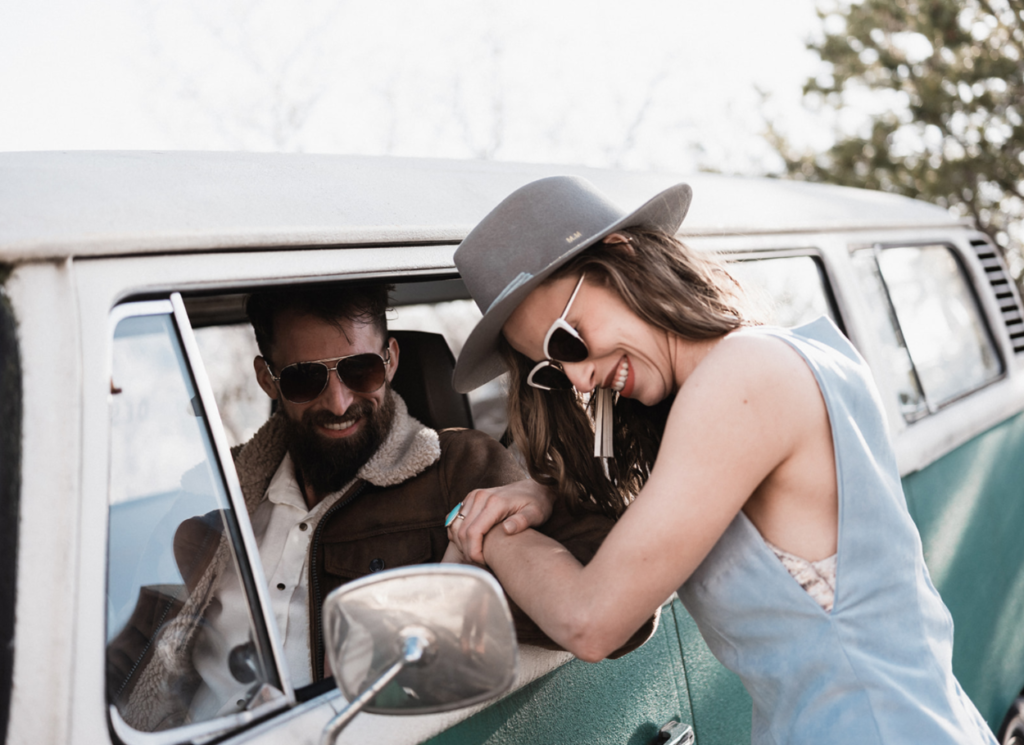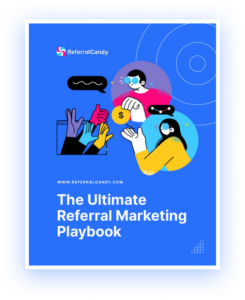
Uphill Designs open-to-the-public workshop space in Seattle
Dan Sedlacek had a passion for making things. This, combined with his love for hiking and a desire to honor his grandmother’s memory, pushed him to leave his stable career as an engineer and build Uphill Designs. Throughout the years, his passion helped him to persevere with his dream of handmaking and selling high quality, lasting products – even when things got tough.
Dan traces it all back to when his grandmother passed: he wanted to honor her memory by following a dream he had stifled for many years: hiking the Pacific Crest Trail.
The trail is a storied, 4,200km hike from Mexico to Canada, spanning the west of the USA. After Dan committed to the 5-month long hike, he set out to look for equipment that suited his needs. After struggling to find what he needed at a price point he could afford, he decided he would attempt to make his own gear.
With an engineer’s love for how things work, Dan decided to craft his own hiking pack.
Scattered and draped around his crafting room were pattern pieces for a lightweight hiking backpack. ‘The hike’s start date was approaching and I had still not finalized my gear. I questioned myself. “Who was I to sew my own backpack? What if I couldn’t do it? What if it failed at a critical point along the months’-long journey and all my gear and food just tumbled off a mountain-side?”’
But, Dan had decided to blog about his experience and after sharing some pre-hike preparations – like cutting the backpack fabric – he felt he had to at least try and see the project through. ‘I have this annoying habit where I always think, I can totally do something! And so even though it took me five times as long as I might have expected, I did it.’ Somewhat surprised, he ended up with a backpack that was robust, lightweight and exactly what he needed.
101 days, 5 pairs of shoes, 3 US states, and 5 million steps later he walked into Canada and finished the trail. When he had come back to reality, he began applying to engineering and consulting firms.
‘But I felt a slight pull, a gentle magnetization away from these responsible and stable careers and toward….something. I wanted to stay connected to the feelings I had on the trail, that was my ‘why’. I had already made hiking gear that lasted 3,000 miles, that became my ‘what’. In searching for a name, I kept coming back to the nickname I had earned on the trail – “Uphill” (because I celebrated every uphill climb).’
Dan left his stable career as an engineer to find something more fulfilling.
It began in September 2014. ‘I was obsessed with different materials and I loved learning about them in school. And the deep resonance of human connection and doing things with my hands had been embedded within me on the Pacific Crest Trail – I couldn’t give that up.’ Dan didn’t start with the leather bags they are known for today, though. Uphill Designs began with bamboo hiking poles with recycled champagne-cork handles.
‘When I was hiking, at about mile 700 we hit Mount Whitney. I heard behind me this heavy breathing: somebody’s catching up with me. All of a sudden there’s this really large man with an open Hawaiian shirt. He was ploughing past me! I had these $150 carbon fiber trek hiking poles and he had two pieces of bamboo in his hands with tape around it. I looked at that and thought, hey, I could make something better than that.’
So Dan started making beautiful, bamboo hiking poles. But after a full year trying to make it work, the business was floundering. ‘As a single-product company, it wasn’t viable.’ Dan wasn’t ready to give up. He kept Uphill going through Kickstarter and by joining an entrepreneurship class.
At his entrepreneurship class, Dan met Mal – another step of fate.
Mal, also studying engineering, joined a small group with Dan in entrepreneurship class. At the end of the course, they had to pitch their company ideas. Dan started talking about Uphill and his experience hiking the trail. ‘There was just something about him that made me certain I was going to talk to him that night,’ Mal said. ‘There was something unmistakable about his passion for the trail, nature and this company that made me very intrigued.’
That night was to set in motion many changes in their lives. They began dating, and Mal offered to help out with the business here and there while she was studying. It wasn’t until Dan’s second Kickstarter campaign though that Mal came on board to help with the business in a larger capacity – contributing everything from product ideas through to financial help. ‘And it turns out, I was really good at it! So I’m still here six years later.’
A leather fanny pack made for Mal really built the company.
After Mal joined, they started to take Uphill’s products to craft markets. By 2017, they had spent 175 days selling at markets – at which point Mal asked Dan to make her a leather fanny pack. ‘Up until that point we did not have a leather bag – but that first leather bag I made for Mal, built our company. Everyone fell in love with the leather fanny pack and we couldn’t make it fast enough!’ Mal remembers it a little differently: ‘He made it for me finally after much grumbling and then he asked if he could take it to the market that weekend – then he sold it!’

Working on leathergoods in Uphill’s Seattle workshop
He made her a second one, and the next week again took it to the market and sold it again. The popularity sparked the idea that there is a huge demand for well-constructed leather bags.
So they started applying their handmade, high-quality design principles to leatherwork instead. This was a step up from their previous hiking bags because the material costs for leather are much higher. Higher price points meant mistakes are more expensive. But they felt most products on the market are created with ‘planned obsolescence – they are meant to fall apart and be bought again.’ So they threw everything into one key goal: creating quality.
Uphill Designs became about creating any product that got better with age.
Their market business began to grow – when it was finally time to expand, they decided they needed to keep the best part of the markets: direct connection with the customer. Talking about the product, customizing products helped them show why their bags were unique. So they decided to open conjoined workshop space and retail store, where their customers could continue to be engaged and involved in their work.

Although the business no longer sold hiking poles and equipment, Dan felt that their ability to quickly adapt, change and migrate allowed them to build something really successful. Their 1,500 square foot workshop in Seattle opened in the Spring of 2018. A rustic, industrial workshop filled one side with sewing machines and leather. The other was a beautiful retail store. This open plan allowed Dan and Mal to continue to engage with their customers.
Together, they managed to do what Dan had failed to do alone.
All was going well with both the business and their relationship. With a steady stream of walk-in customers, they were doing what they loved, and they were in love. Not long after, they drove out to Utah to get married.

While they were there, they got a worrying phone call. The city of Seattle had torn up a mile of the road in front of their workshop. It was so bad that Google maps had routed all traffic far away from the area. ‘We just panicked. Walk-in retail was 90% of our revenue and after calling our landlord, we worked out that businesses had been warned before moving in and the work would be going on for 6 months.’
‘It was harder than anything I had undergone hiking that trail. It was harder than anything I had done previously,’ Dan says. They’d set up a business model that didn’t translate well to online sales. Walk-in traffic was the lifeblood to their business. ‘It’s really easy to tell our story when someone walks into the workshop. They can physically see you putting the rivet on their leather bag. Everything just clicks.’
They had little choice but to brace themselves, reduce expenses as much as they could and try to hold on. But when the roadworks completion date kept getting extended, they (and the other small businesses on the street) began to worry. They looked into moving the workshop, but commercial leases are notoriously difficult to get out of. ‘We talked about what our energy should be put towards to make it through. I started teaching entrepreneurship at a couple of local colleges.’ They also started offering workshops in their space. Enticing people in with classes like leather flask making and whisky tasting.
Dan and Mal started to fear for their communities fate as well as their own.
While doing everything they could to stay afloat, Dan and Mal began talking to other small businesses on the street. This was much bigger than just them. They knew that everyone would need to band together if anyone had a chance of surviving. Taking the responsibility into their own hands, they decided to throw a benefit concert for the street. They threw themselves into organizing, managing to raise enough to pay for a couple of months rent for three different businesses.
It was a long 15 months after the works had begun when the street reopened. It was a trying time for Dan and Mal, but they never thought about throwing it all away. ‘We wouldn’t want to be doing anything else, even when it was difficult,’ Mal shares. ‘We wondered if we should file for bankruptcy and move on. But we agreed that even though this is really hard in a lot of ways, we are still so much more interested in continuing with versions of this than doing anything else.’
By banding together with their neighbours, they had managed to make it through.
As soon as the street reopened, business went back to normal. Coming out the other side of the ordeal, Dan and Mal had developed a newfound interest in community support. Now Uphill was back on track, they dedicated some of their time to supporting others. They rented a 15,000 square foot building downtown and turned it into a small business incubator. Working with the building owners, they managed to negotiate a low cost for makers and artists to come in and build their businesses.
What do Dan and Mal feel has been most important for their success? ‘It’s all about being willing to change and evaluate, be in constant conversation with yourself and your people you’re trying to serve. As long as you treat your business model like a continuous process rather than something static, you can make it through!’
…
Dan and Mal are the owners of Uphill Designs in Seattle, USA. They make handmade leather bags and leather products with strict design principles based around quality, longevity and personalization.
Merchant Stories: Real entrepreneur stories from real people. If you’d like to share your merchant stories, email us.


